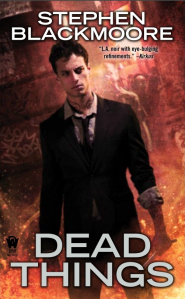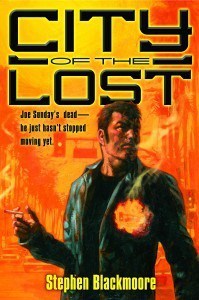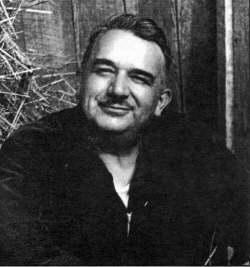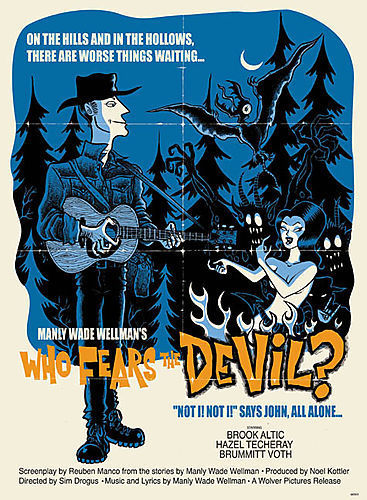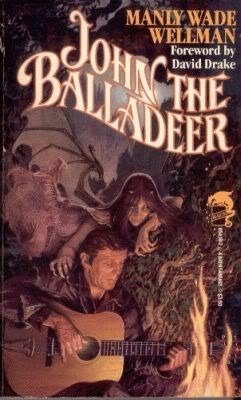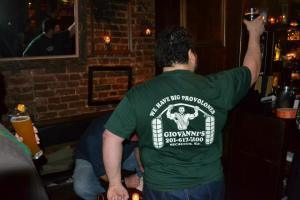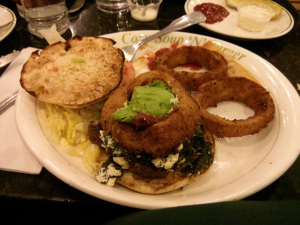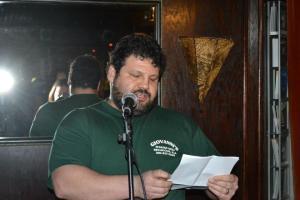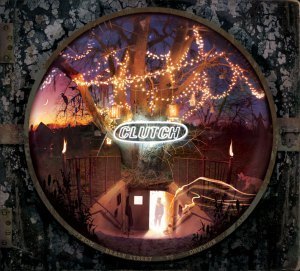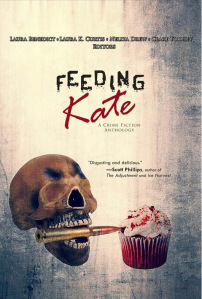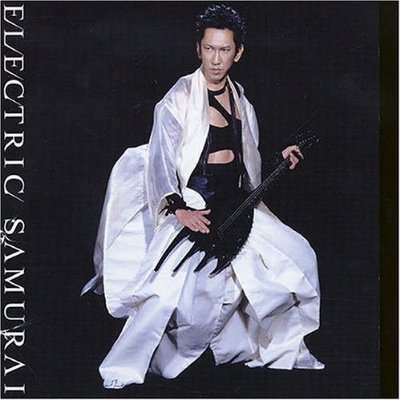Thomas Pluck's Blog, page 49
February 8, 2013
Free Story Friday – JOIN US!
Let’s start a new trend: #FreeStoryFriday on Twitter.
Find a story of yours – or one that you enjoy – that is free to read online, and share it on Twitter using the hashtag #FreeStoryFriday.
I’ll begin with “Punk Dad Manifesto,” which first appeared in The Morning News. It was picked up by The Utne Reader, and they added a cute illustration. Read it on either website, completely free.
All of my publications are listed on My Fiction Page and if you scroll down, the ones you can read for free online are in their own section.
And if you get hungry, here are some hash browns.
Tagged: Punk, The Morning News, Utne Reader



February 7, 2013
Belly Up to the Bar with Stephen Blackmoore
Stephen Blackmoore is the author of CITY OF THE LOST and DEAD THINGS, hard-boiled urban fantasies where demons and deadbeats commingle with necromancers and the Cosa Nostra. I enjoyed the hell out of the delightfully profane and imaginative CITY OF THE LOST, where a foul-mouthed fist for the mob finds himself blessed and cursed by a powerful artifact that denizens of the L.A. “underworld” will do anything to get. He returns with DEAD THINGS, out this month from Penguin, about a necromancer seeking answers and vengeance after his sister is murdered.
 TP: Welcome to Belly Up to the Bar, Stephen. What are you drinking?
TP: Welcome to Belly Up to the Bar, Stephen. What are you drinking?
 SB: A Manhattan. Bulleit rye, sweet vermouth, Angostura bitters and a couple maraschino cherries. The cherries make me question my manhood. BUT I DON’T CARE.
SB: A Manhattan. Bulleit rye, sweet vermouth, Angostura bitters and a couple maraschino cherries. The cherries make me question my manhood. BUT I DON’T CARE.
I might also be slightly drunk.
 TP: Number one with a Bulleit. Fine drink. I will admit that I was not a fan of urban fantasy until I read City of the Lost. Just the right amount of menace, and I felt like the world was just a shadow game for the sinister goings-on of the underworld. The closest I ever liked was that HBO movie “Cast a Deadly Spell,” which brought magic to Chandler’s L.A. Tell us about your new one, DEAD THINGS.
TP: Number one with a Bulleit. Fine drink. I will admit that I was not a fan of urban fantasy until I read City of the Lost. Just the right amount of menace, and I felt like the world was just a shadow game for the sinister goings-on of the underworld. The closest I ever liked was that HBO movie “Cast a Deadly Spell,” which brought magic to Chandler’s L.A. Tell us about your new one, DEAD THINGS.
 SB: Funny thing, Cast A Deadly Spell was actually one of the inspirations for City Of The Lost. Ever since I saw it in the 90′s I’ve wanted to do something with magic and hard-boiled pulp. The gremlin scene is priceless.
SB: Funny thing, Cast A Deadly Spell was actually one of the inspirations for City Of The Lost. Ever since I saw it in the 90′s I’ve wanted to do something with magic and hard-boiled pulp. The gremlin scene is priceless.
DEAD THINGS is an urban fantasy about a necromancer, Eric Carter, who bailed on his friends and family fifteen years ago after he avenged his parents’ death by killing their murderer. He was given a choice. Get out of town or his sister gets it next.
Well, now his sister has turned up dead and the whole thing stinks of magic. Carter comes back to Los Angeles to find out who did it and things go rapidly downhill.
 TP: I found you through your blog
L.A. Noir
, when you wrote about the underground lizard people conspiracy. What do you like best, and least about the city you call home?
TP: I found you through your blog
L.A. Noir
, when you wrote about the underground lizard people conspiracy. What do you like best, and least about the city you call home?
 SB: They’re actually the same thing.
SB: They’re actually the same thing.
I had a conversation with a friend of mine a couple years ago that went something like:
“You’re pretty hard on L.A.”
“What do you mean? I love this town. It’s so fucked up.”
“That,” he said. “That’s what I’m talking about.”
It’s true. I am hard on L.A. It’s a beautiful mess. It’s got too much sunshine and not enough rain. Plastic tits abound and starstruck hopefuls come out from the middle of bumfuck nowhere to try their hand at the illusion of being somebody. It’s got a weird history that nobody knows about that gets bulldozed daily.
I was in a coffee shop one time and overheard a woman talking with a prospective agent about representing her in her acting career. It was surreal. And sad. And more than a little cliché.
She’d come out from Kansas and was “dancing” and hadn’t been able to get any parts. He was very professional and very blunt and as kind as those two things can allow a person to be. And he had to tell her that he didn’t think working with her was going to benefit either of them.
To her credit she didn’t cry, but she was crestfallen. It was a disturbingly public display of something that should be very personal and very intimate, but out here that’s just what happens. Careers are made or lost over a latte.
It’s depressing and it’s fascinating at the same time. It’s that dichotomy of dystopia and the sense that any dream is attainable that makes me love it so much.
 TP:
In writing horror, the characters bleed. But with humor, it’s the writer who bleeds. It’s the toughest to write, if you ask me. But you made me laugh quite a bit in CITY OF THE LOST, especially with the demon bartender. I grew up on Mel Brooks and George Carlin when I was way too young to get the jokes. Who do go to for laughs?
TP:
In writing horror, the characters bleed. But with humor, it’s the writer who bleeds. It’s the toughest to write, if you ask me. But you made me laugh quite a bit in CITY OF THE LOST, especially with the demon bartender. I grew up on Mel Brooks and George Carlin when I was way too young to get the jokes. Who do go to for laughs?
 SB: The thing with a joke is that sometimes it tells the truth a lot better than the truth does.
SB: The thing with a joke is that sometimes it tells the truth a lot better than the truth does.
I have a pretty dark sense of humor. That’s just how I’m wired. I’ve been called cynical and a pessimist, which I am to some extent, I suppose, but some of it comes from seeing things the way they are and knowing that they could be, that they should be, better.
For me my go-to for comedy are things like The Onion. It’s funny but it’s brutal. Headlines like “Ugly Girl Killed: Nation Unshaken By Not So Tragic Death” say a hell of a lot more than they look like they’re saying. I prefer humor that pushes me to think and question my assumptions. Especially if it’s the sort of humor that makes me wonder if I should laugh.
I try to capture that same sort of humor with the L.A. Noir blog. It isn’t for everybody.
So I like guys like George Carlin, who liked to slap you upside the head with the truth as much as he tried to be funny.
But sometimes I just want some slapstick. And that’s the Marx Brothers for me. I love watching the mirror scene in DUCK SOUP or the suitcase packing routine in A NIGHT IN CASABLANCA.
 TP: And on the flip side, there’s definitely a horror vibe in the first book. Now that I’m older, horror doesn’t affect me as much. The scariest movies to me as a kid were? For me, it was the trinity of Alien, The Thing, and Poltergeist. Especially the last one, with that damn tree swallowing a kid. I sneaked in to see that movie, and when I got home, there was a tree branch rattling my window. So what scared the shit out of you as a kid?
TP: And on the flip side, there’s definitely a horror vibe in the first book. Now that I’m older, horror doesn’t affect me as much. The scariest movies to me as a kid were? For me, it was the trinity of Alien, The Thing, and Poltergeist. Especially the last one, with that damn tree swallowing a kid. I sneaked in to see that movie, and when I got home, there was a tree branch rattling my window. So what scared the shit out of you as a kid?
 SB: A lot of horror isn’t very frightening to me. It’s gross and ridiculous and fun to watch, sure, but actually scary? Not a lot of those.
SB: A lot of horror isn’t very frightening to me. It’s gross and ridiculous and fun to watch, sure, but actually scary? Not a lot of those.
There are some obvious ones. The Shining, particularly the bathroom scene in room 237, got to me. Some of the more gore-filled ones where the scares were the kind that jumped out of the screen. But those are more startling than anything else.
But the one that really got to me was one I’ve never actually seen.
It’s a movie called BUG. Came out in the seventies. I was about six at the time. It’s about these mutant cockroaches. They cause fires, maybe eat people? I don’t know. Like I said, I’ve never seen it.
But there was my older brother who had. And he liked to fuck with my head.
Kids are assholes and if I’d been the older brother I’d have done the same thing to him. We shared a room and I remember him freaking me out about these giant fire-breathing cockroaches come to eat me, or some shit. I’m a little fuzzy on the details. I just remember being terrified.
Hey, what do want from me? I was six-years-old.
But that’s still an impressive feat. And I think it shows, to me at least, that sometimes the most effective scares are the ones you don’t see. The ones where it’s just your own imagination filling in the blanks and you end up scaring yourself.
The best horror stories are the ones that let our brains do all the heavy lifting.
Blair Witch Project did it surprisingly well. At its core it’s just a bunch of morons who get lost in the woods. But it’s done in such a claustrophobic way and through such a tight view, that it pokes at your mind and lets it do all the work.
 TP: As you noted on your blog, violent crime is way down across the nation. But it seems to me that fear is at an all time high. Gun sales are through the roof, zombie apocalypse is mainstream and doomsday preppers have their own reality shows. What do you think we’re afraid of?
TP: As you noted on your blog, violent crime is way down across the nation. But it seems to me that fear is at an all time high. Gun sales are through the roof, zombie apocalypse is mainstream and doomsday preppers have their own reality shows. What do you think we’re afraid of?
 SB: I think we’re afraid of losing control. Not that much different from our fears at any other time, though years ago, at least here in the U.S., it had the face of the Evil Empire of the Soviet Union, to put on to that fear. Despite some people’s best efforts to use [Insert Ethnic Group Of Choice]. They’re our friends and co-workers. Husbands and wives. They’re *gasp* real people! Makes it hard to see them as Objects Of Evil.
SB: I think we’re afraid of losing control. Not that much different from our fears at any other time, though years ago, at least here in the U.S., it had the face of the Evil Empire of the Soviet Union, to put on to that fear. Despite some people’s best efforts to use [Insert Ethnic Group Of Choice]. They’re our friends and co-workers. Husbands and wives. They’re *gasp* real people! Makes it hard to see them as Objects Of Evil.
I think it’s actually pretty hard to dehumanize people in the internet era. Not that a lot of assholes don’t do a bang up job of it, of course. There’s simply too much information showing people at their best and their worst. If you can easily dehumanize another human being in this day and edge it’s willful ignorance and you’re a dick. You really have to work at it.
I think it’s that lack of a face to assign our fears that has given rise to zombie apocalypse horror. Zombies are dread writ large, our anxieties made manifest. They’re the inexorable procession of doom that will consume you and you’re powerless to do anything about it. They the stand-in for rapid change, advanced technology, the invasion of languages you can’t speak and new foods from other cultures. They’re all the things that are changing faster than we can keep up with.
You can’t really humanize a zombie without turning it into something else.
Kind of like with Frankenstein. In Shelley’s novel he’s intelligent and educated and you side with him. In the Karloff movies he’s a mute beast. The minute you give the monster a voice it ceases to be a monster and starts to become a person.
I think this kind of faceless anxiety gives rise to the hoarders, and doomsday preppers and people freaking out that Obama will take away their guns. It’s a knee-jerk reaction to anxiety, only couched in the disguise that we’re doing something. We’re not, really. We’re letting our anxieties rule us. Not the other way around.
If you’d asked me the same question 20 years ago I think I’d have had the same answer. Or at least something similar. Instead of zombies it would be, going back to your earlier question about horror, the loss of identity and paranoia inherent in The Thing, loss of self in Cronenberg’s body horror, losing yourself to the overwhelming appetite of vampires and Barker’s Cenobites.
It’s all loss of control, isn’t it? Even death pales in comparison to paralysis. Who is the more tragic figure? The child dying of cancer or the father who can do nothing to stop it?
 TP: You’ve written about Chandler. The classics still speak to us. I think Crumley echoed Chandler with The Last Good Kiss and updated it to the post-Vietnam era. What’s your favorite book or author from the old days, and how does it matter today?
TP: You’ve written about Chandler. The classics still speak to us. I think Crumley echoed Chandler with The Last Good Kiss and updated it to the post-Vietnam era. What’s your favorite book or author from the old days, and how does it matter today?
 SB: I respect Chandler, though I don’t always like him. I like his voice. Most of the time. His plots are a meandering mess. He can’t even keep track of his murder victims.
SB: I respect Chandler, though I don’t always like him. I like his voice. Most of the time. His plots are a meandering mess. He can’t even keep track of his murder victims.
But I think he and Hammett, Caine, Goodis, Thompson and all the old pulp novelists who jumped into the noir pool show us something about the way people work that literature didn’t dig into much before they showed up.
It’s been said that Hammett pulled murder out of the drawing room and stuck it into the gutter where it belonged.
Same is true of the rest of these authors. They took the most visceral experiences of humanity and let them be visceral. They fight and swear and fuck and kill and they only shied away from something because their editors insisted. And even then they got some things through.
Their influences, obvious and subtle, have invaded the landscape. To me they’re important because I don’t think I’d be able to write the way I want to if they hadn’t shown me how.
 TP: Death row, Stephen. They’ll give you a movie to watch, an album to spin and of course, the last meal. What are yours?
TP: Death row, Stephen. They’ll give you a movie to watch, an album to spin and of course, the last meal. What are yours?
 SB: Movie: The Lion In Winter. It might help me think of something snappy to say as they lead me to the chair.
SB: Movie: The Lion In Winter. It might help me think of something snappy to say as they lead me to the chair.
Album: Anything that isn’t Jethro Tull. I’ll be fine as long as I don’t have to go into the afterlife with “Bungle In The Jungle” stuck in my head.
Meal: A big old, fart inducing meal of Mexican food. Those fuckers want to kill me then the least I can do is make it messy for ‘em.
 TP: I love Lion in Winter. Emotionally brutal. And I can’t find a good clip of it, but Terence Hill did exactly did the electric chair bean-bomb in Super Fuzz. A ridiculous Italian superhero cop comedy with Ernest Borgnine. I highly recommend it. Thanks for coming by, Stephen. I look forward to reading DEAD THINGS. What’s next for you?
TP: I love Lion in Winter. Emotionally brutal. And I can’t find a good clip of it, but Terence Hill did exactly did the electric chair bean-bomb in Super Fuzz. A ridiculous Italian superhero cop comedy with Ernest Borgnine. I highly recommend it. Thanks for coming by, Stephen. I look forward to reading DEAD THINGS. What’s next for you?
 SB: Well, I’ve got another novel coming out as part of Evil Hat Productions’ SPIRIT OF THE CENTURY Kickstarter from last year, KHAN OF MARS. It’s gone out to the backers of the Kickstarter over the weekend, so we’ll see what they think of it. So far signs are good.
SB: Well, I’ve got another novel coming out as part of Evil Hat Productions’ SPIRIT OF THE CENTURY Kickstarter from last year, KHAN OF MARS. It’s gone out to the backers of the Kickstarter over the weekend, so we’ll see what they think of it. So far signs are good.
I’ve also got two more books that will continue to chronicle Eric Carter’s unfortunate life choices, BROKEN SOULS and HUNGRY GHOSTS, coming out in 2014 and 2015 respectively.
After that, who knows?
~*~
Stephen Blackmoore is the author of the novels CITY OF THE LOST and DEAD THINGS and his short stories have appeared in the magazines NEEDLE, PLOTS WITH GUNS, SPINETINGLER, THRILLING DETECTIVE, and SHOTS as well as the anthologies DEADLY TREATS, DON’T READ THIS BOOK and UNCAGE ME. He also writes about true crime in Los Angeles at the LA Noir blog (http://la-noir.blogspot.com) and co-hosts the bi-monthly reading event Noir At The Bar L.A. (https://www.facebook.com/NoirAtTheBarLa).
Tagged: Cast a Deadly Spell, City of the Lost, Dead Things, Horror, Stephen Blackmoore, Urban Fantasy


February 6, 2013
Promotion ad Nauseam
Self-promotion is my least favorite aspect of writing, and I know I am not alone. I’ve done it wrong before, but I am trying to get better. I have read articles on dos and don’ts and secrets and no-nos, and coupled with my Internet Dinosaur badge (1988… that makes me a young dinosaur) let me suggest the following:
If it feels wrong, don’t do it.
If you automate twitter posts to recur so many hours, I am not going to follow you or follow you back. Because I want to follow people, not town criers or newsfeeds. If all you post is essentially an RSS feed, I will instead follow your blog using my RSS reader. There is no magic number, but I try not to post a link to Protectors more than once a day, usually less often. In the past, I was not as polite, but I learned my lesson. There are twitter tools to find when the most of your followers are active. Share it then. Automate it, even. It’s once a day, who cares? As long as you communicate like a human, it won’t be obvious that you’re like a classic rock station playing “Layla” at precisely 4:32 every day.
A wiser writer than myself said that most people who follow you already buy your books and read your stories. Make them aware of new ones for a brief time, in small doses.
Do NOT send direct messages, especially canned sales pitches like “check out my webpage” or “thanks fr the follow my new book comes out next week RT plz” … this is SPAM. No one likes it. Plenty of people block folks who do this. I unfollow, even writers who I want to follow. Because I know what’s coming next, the spew of self-promotion. Do not feel compelled to follow people back. Are they interesting? Do they simply RT stuff? Listen, this isn’t a circle jerk. If you follow me just to get a follow back, please unfollow me now.
Facebook is less onerous, because if you talk politics or update your wordcount every few hours, I can unclick “Show in News Feed” and mute you. I know writing feels like hard work, but we really need to stop acting like punching in another 2000 words is worthy of discussion. Writers write. Do you write? Great, you’re a writer. We don’t need reaffirmation of this. If you need a daily affirmation- Lawrence Block stresses their importance- read his fantastic guide Telling Lies for Fun and Profit, or the excellent Break Writer’s Block Now! by Jerrold Mundis. Both will teach you how to write in an organized manner, which won’t make a few pages seem delivering a breech birth.
Only make an author page if you also are not friending everyone in sight. Pages are good for keeping personal and professional life separate. There is no point (other than ego-stroking) to invite friends to Like your author page. Friends who like your pages get to see your posts repeated 3-5 times, and again when you share them with Groups. It gets overwhelming and annoying. Also, don’t make a page for every book you write. That’s just silly, it dilutes your fan base. I made this mistake, by making an author page. If we’re friends, please feel free to unlike this page. I have a separate page for the Protect anthologies- this allows people to be alerted of a new charity anthology without having to “be friends” and share personal info with me. That is the only reason for a page on Facebook if you have fewer than 5000 friends (the max).
Mailing Lists
Mailing lists are great. But you know what? E-mailing your entire contact list, or a hidden list of writers and friends is NOT A MAILING LIST, IT IS SPAM. It’s passive-aggressive as hell, because to ask to be removed, the recipient has to tell you they don’t want to hear about your latest story/interview/baby/book/puppy fart video. You want to be a pro, act like one. Use a mailing list service. Mailchimp is one the pros love. It forces you to follow all the anti-spam laws and readers can subscribe and unsubscribe with a click. It is also free. You have no excuse. It asks for your address, so get a P.O. Box. Take some advice from pro Briane Keene’s “Writing Full Time” speech and get a P.O. Box anyway. You will want the privacy it affords you.
Blogging
Blog every day! Actually, don’t. I did for years. I’d sit around thinking of what to blog. I reviewed every movie I saw. It was boring for me and for readers. Blog when you have something to say. A few times per week. Daily if you aren’t rehashing stuff you’ve said a thousand times before. I blog about a new band, a movie, a dining experience, books, and I try to interview someone at least once every two weeks. The interviews take the most time, I come up with the questions on lunch break, and I edit them and make them look pretty on another lunch break. Blogging is writing- it will sap your creative energies- but it can also inspire you and kickstart you into writing on days when the fingers just want to scratch your ass instead. (NOTICE: all employees must wash hands before writing)
Goodreads Contests
I haven’t done one of those yet, but people sure love them. I don’t see a downside unless you spam about them. Don’t auto-DM people about this or your Kickstarter. They will see it in your feed when you post about it incessantly.
Well That’s Just Like Your Opinion, Man
Yes, it is. These are my opinions. Some people are better at ignoring bad Internet etiquette. And some people go on rampages to destroy people with bad ‘net manners. You don’t want them on your back. The more popular you get, the bigger chance you’ll piss one of them off.
Writers Who Do It Right™
Here are a few writers, both new and established, who in my opinion do it right: Lawrence Block, Andrew Vachss, Christa Faust, John Scalzi, Stephen Blackmoore, Karina Cooper, Christopher Moore, Roxane Gay, Ray Garton, Dan O’Shea, Mat Johnson, Charles Stross, David Brin. I have conversed with all of these writers. They don’t answer every tweet or FB comment, but they interact with writers and fans alike. They do not use their fan base as “minions” or ask questions that could be answered with a Google search. They do not spam you about their new releases, but they make you aware of them. They treat people with respect and thus get it in return. They do not circle-jerk and promote you for promoting them, or reek of desperation.
We all get excited about our work and yes, the best way to get the word out is on the Internet, but let’s do it right and not give writers a bad name. We don’t want to be lumped with Real Estate Agents at parties, do we? Are you looking to buy a house? I can get you a great deal on a mortgage *BLOCK*
Salami out.
Tagged: blogathons, Internet, Rants, Writers



February 5, 2013
Manly Wade Wellman
One of the lesser-known giants of the golden age of pulp is Manly Wade Wellman. He is best known for the “Silver John” tales of a folk singer with a pure heart and a silver-strung guitar who wanders the hills and hollers of Appalachia seeking “the old music,” who often runs into evil magics and “the old ones” instead.
The Silver John tales evoke the purely weird through an American folk lens, where creatures of the age before mankind leave their footprints through the hollers and hoodoo men hold sway. John has only his wits, his silver-stringed guitar and his powerful faith in good to wage battle with evil. The tales are laced with subtle humor and Wellman masterfully describes a character or a place with few sharp words, bringing you into his fantastic realm where the world may have waged two wars and split the atom, but somewhere in the mountains there still lurk creatures we cannot begin to comprehend.
There were a few movies based on them as well, but none seem to have captured the magic. Wellman’s fiction was a huge influence on my long short story “Black Shuck” in Protectors: Stories to Benefit PROTECT.
Manly Wade Wellman was an American original, a stunning fabulist who painted haunted murals of the Appalachian mountains using the language of the people who live there as his handmade oils and brush. His books are mostly out of print, but Baen has graciously included a collection of Silver John stories in their free electronic library:
I highly recommend the entire collection, but especially ”O Ugly Bird,” “The Desrick on Yandro,” and “Nine Yards of Other Cloth.” They are set after the second World War, but feel timeless and ancient, like the mountains themselves. He wrote several novels starring Silver John, such as The Old Gods Waken, and I purchased some on eBay. My local used bookstore didn’t have any. I look forward to seeing what John does with some room to stretch his legs in a story.
Tagged: Appalachia, Horror, Manly Wade Wellman, Protectors Anthology, Silver John, Weird Tales



February 1, 2013
Fresh Kill: Noir at the Bar Burger!
After reading at Noir at the Bar NYC, Firecracker and I went out for burgers with friends Paula Pahnke (a writer whose work appears in the Lost Children anthology) and her man Dennis. Paula led us through the freezing cold to Cozy Soup ‘n Burger on Broadway, a diner institution offering much more than burgers and soup. We all had burgers. But first things first… here is the greatest shirt in creation. Photo by Glenn Gray. I reviewed Giovanni’s a while back. They make-a nice sangweech, paisans.
They make a good burger but they overcook it a bit. Not competition for Krug’s, but this is a top tier diner burger. I had the Santorini Burger- spinach and feta on an English Muffin- with purloined avocado and onion ring added.
Noir at the Bar was a blast again. Thanks to Glenn Gray and “Big Daddy Thug” Todd Robinson for having me again. This time the lineup had Hilary Davidson, Al Tucher, Matthew McBride, Kathleen Gernert Ryan, Reed Farrell Coleman, Justin Porter, Terence McCauley, SJ Rozan, and Seamus Scanlon. Glenn, Todd, and Laurie- bartender extraordinaire- plus all the crew at Shade NYC- thanks again for a great evening.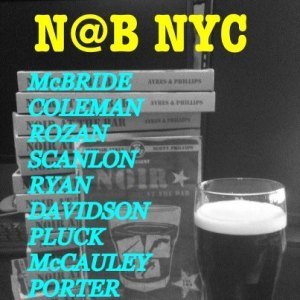
Also in attendance was Josh Bazell, author of BEAT THE REAPER, one of my favorites of the last decade. I reviewed it ages ago. It’s one of the books that showed me you could write a crazy story if you were good enough, and Josh sure is. Here’s my reading of “Tiger Mother,” a short story that appears in Noir Nation #2.
Tagged: Al Tucher, Burgers, Firecracker, Glenn Gray, Hilary Davidson, Justin Porter, Kathleen Gernert Ryan, Matthew McBride, New York City, Noir at the Bar, Reed Farrell Coleman, Seamus Scanlon, SJ Rozan, Terence McCauley, Todd Robinson



January 29, 2013
Bang Bang Bang Bang. Vaminos vaminos.
This is “Electric Worry” by the prog rock band Clutch. They may chafe at the term progressive rock but they sing about Riddley Walker, Minotaurs and have a delightfully absurd sense of humor. I recommend their album “From Beale Street to Oblivion” without reservation. My sister introduced me to them, and their album “Strange Cousins from the West” is also a great listen.
Doctor or lawyer I’ll never be
Life of a drifter, the only life for me
You can have your riches, all the gold you saved
Ain’t but room for one thing in everybody’s grave
Tagged: Clutch



January 28, 2013
Kamikaze Death Burgers at the Ghost Town Cafe
Just got some great news- the anthology written to fund jaw surgery for my dear friend Sabrina Ogden, Feeding Kate- is now available on Kindle, and the proceeds will benefit the Lupus foundation.
If you didn’t jump on the Indiegogo campaign, the book is now available on Amazon for $5.99 in e-book form. It includes my story “Kamikaze Death Burgers at the Ghost Town Cafe,” a Jay Desmarteaux yarn. If you enjoyed Jay’s exploits in “Gumbo Weather” in the latest issue of Needle, or his brawl in Hills of Fire: Bare-Knuckle Yarns of Appalachia (which is nominated for best fiction anthology by the Appalachian Writers Association) you will want to read Jay’s biggest, baddest story yet:
Jay is “just getting by” running contraband in a pristine ’57 Cadillac Eldorado Brougham when he crosses paths with a criminal biker gang, a murderous truck driver, and the mysterious Kate. Jay is forced to take sides when all three converge for an explosive battle in the Utah desert.
This story is a favorite of mine, and if you’re wondering what Jay’s novel is like, this is the best taste you’ll get. It’s all for a great cause and includes fiction by this amazing roster of authors:
Ellie Anderson
Laura Benedict
Stephen Blackmoore
Joelle Charbonneau
Laura K. Curtis
Hilary Davidson
Neliza Drew
Chad Eagleton
Jenny Gardiner
Daryl Wood Gerber
Kent Gowran
Chris F. Holm
Dan O’Shea
Ron Earl Phillips
Thomas Pluck
Chad Rohrbacher
Linda Rodriguez
Johnny Shaw
Josh Stallings
Clare Toohey
Steve Weddle
Chuck Wendig
Holly West
Tagged: charity, Feeding Kate, Sabrina Ogden



January 24, 2013
Belly Up to the Bar with Jenny Milchman
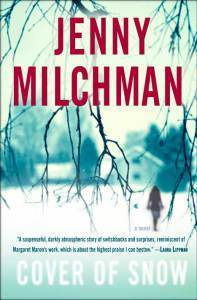
Waking up one wintry morning in her farmhouse in the Adirondack Mountains, Nora
Hamilton’s world is shattered: Her husband, Brendan, has committed suicide.
The first hours following Nora’s devastating discovery pass in shock. Why would a rock-
solid police officer and husband suddenly kill himself? Having spent a lifetime avoiding
hard truths, Nora must now start facing them.
Unraveling Brendan’s final days, Nora searches for an explanation—but finds
bewildering resistance from everyone in town. Nora realizes that she is asking questions
no one will answer. For beneath the soft cover of snow lies a conspiracy that will do
anything to keep its darkest secrets hidden.
Jenny Milchman is the author of COVER OF SNOW, due out January 15th from Ballantine Books. With a starred review from Publisher’s Weekly, and effusive praise from Harlan Coben, Laura Lippman, Lee Child, and Hank Philippi Ryan, it may be set in the frigid winters of the Adirondacks but it is white hot. I met Jenny at Watchung Booksellers for Writing Matters, a panel to introduce readers and authors, on the day she announced her book was accepted for publication. And today I invite her to Belly Up to the Bar, to talk about her journey to publication over a hot buttered rum, and whatever she’s having.
 TP: Welcome to Belly up to the Bar, Jenny. What can I get you?
TP: Welcome to Belly up to the Bar, Jenny. What can I get you?
 JM: Well, hot buttered rum is something I’ve always wanted to try, but I’m also going to set this pitcher of hot chocolate spiked with kahlua down on the bar. You need grownup hot chocolate to get through an Adirondack winter. Please–feel free to have some.
JM: Well, hot buttered rum is something I’ve always wanted to try, but I’m also going to set this pitcher of hot chocolate spiked with kahlua down on the bar. You need grownup hot chocolate to get through an Adirondack winter. Please–feel free to have some.
 TP: First, let’s get everyone on the edge of their seats. Tell us about COVER OF SNOW.
TP: First, let’s get everyone on the edge of their seats. Tell us about COVER OF SNOW.
 JM: Cover of Snow came to life when one question grabbed me around the throat and wouldn’t let go. What would make a good man do the worst thing he possibly could to his wife? And what would that thing be?
JM: Cover of Snow came to life when one question grabbed me around the throat and wouldn’t let go. What would make a good man do the worst thing he possibly could to his wife? And what would that thing be?
OK. Two questions.
 TP: There’s something about being snowed in that lends itself to mystery, isn’t there? The hush that falls over the world, the bitter cold that drives inside, the secretive hooded coats we get to wear. Fargo, Snow Falling on Cedars, the popular Scandinavian thrillers all make use of the icy season. What drives your story out into the cold?
TP: There’s something about being snowed in that lends itself to mystery, isn’t there? The hush that falls over the world, the bitter cold that drives inside, the secretive hooded coats we get to wear. Fargo, Snow Falling on Cedars, the popular Scandinavian thrillers all make use of the icy season. What drives your story out into the cold?
 JM: All of the factors you mention—and one other. Snow makes things difficult. It’s romantic, all of that white, but it’s also very hard to live with. There are minor hassles like having to dig out your car or unfreeze your locks. And then there are bigger risks like falling or even getting lost and freezing to death.
JM: All of the factors you mention—and one other. Snow makes things difficult. It’s romantic, all of that white, but it’s also very hard to live with. There are minor hassles like having to dig out your car or unfreeze your locks. And then there are bigger risks like falling or even getting lost and freezing to death.
Snow changes the landscape. One day my heroine’s husband, Brendan, went out into a snow-strewn world. And what happened out there meant that he could never really return to live amongst warmth and the sun again.
 TP: I love the question that your book asks: What would make a good man to do a very bad thing? Tease us a little. You can’t tell us the answer, but what made you ask the question?
TP: I love the question that your book asks: What would make a good man to do a very bad thing? Tease us a little. You can’t tell us the answer, but what made you ask the question?
 JM: I am one of those people who, to borrow author Rosellen Brown’s term, thinks in the before and after. What moments tip us over from one side of the line to the other? The question of what my heroine’s husband did was one of those. What would it be like if a woman woke up, fully and reasonably expecting her husband to be beside her, and he wasn’t?
JM: I am one of those people who, to borrow author Rosellen Brown’s term, thinks in the before and after. What moments tip us over from one side of the line to the other? The question of what my heroine’s husband did was one of those. What would it be like if a woman woke up, fully and reasonably expecting her husband to be beside her, and he wasn’t?
 TP: I think asking a writer her influences is rather cliche–we are influenced by all sorts of things other than books–but let me ask anyway. Are you a lifelong mystery fan, and if so, whose writing lured you into the murder biz?
TP: I think asking a writer her influences is rather cliche–we are influenced by all sorts of things other than books–but let me ask anyway. Are you a lifelong mystery fan, and if so, whose writing lured you into the murder biz?
 JM: I am a lifelong reader of the suspense, horror, mystery, and thriller genres. As a child it was the horror writers who inspired me most of all. Stephen King, Ira Levin, William Peter Blatty; books like The Bad Seed and The Omen and Audrey Rose. The most influential mystery I ever read was Winifred by Doris Miles Disney. I think it has one of the best last lines ever written.
JM: I am a lifelong reader of the suspense, horror, mystery, and thriller genres. As a child it was the horror writers who inspired me most of all. Stephen King, Ira Levin, William Peter Blatty; books like The Bad Seed and The Omen and Audrey Rose. The most influential mystery I ever read was Winifred by Doris Miles Disney. I think it has one of the best last lines ever written.
 TP: I’ll have to check that one out. I’ve heard about your long journey to publication, and it both inspired me and steeled me for the hard work ahead. But humor us, and tell the story again for our readers.
TP: I’ll have to check that one out. I’ve heard about your long journey to publication, and it both inspired me and steeled me for the hard work ahead. But humor us, and tell the story again for our readers.
 JM: I will…just as soon as I can pick myself up off the ground and force myself to go over the harrowing details. No, I’m kidding. And Tom, please take heart—it doesn’t always take as long as it did for me. I believe that we writers all put our time in somewhere along the line. Could be in the writing, the agent search, the getting an offer part, or even the next book. At some point, it usually takes a while.
JM: I will…just as soon as I can pick myself up off the ground and force myself to go over the harrowing details. No, I’m kidding. And Tom, please take heart—it doesn’t always take as long as it did for me. I believe that we writers all put our time in somewhere along the line. Could be in the writing, the agent search, the getting an offer part, or even the next book. At some point, it usually takes a while.
For me, I feel lucky that the writing itself is almost always pure joy. There is just nothing like a first draft for me. And I was also pretty lucky on the agent front, getting offers of representation within about eight months. But after that, things bogged down. My agents had interest from editors, but editors have to get their whole houses on board before an offer can be made.
In total, I wrote eight novels over a period of eleven years, worked with three agents who garnered fifteen almost-offers before Cover of Snow finally sold.
It happened at the eleventh hour. My agent and I were out of options, and the publishing world had changed out from under me in the decade + I spent trying. I was seriously considering publishing either on my own or with a teeny new micro press.
And then an author whose work I loved was kind enough to read my unpublished manuscript, which she loved and gave to her own editor, who also loved it, and within five weeks, I had a contract and my whole writing life—my whole life in some ways—had changed.
If anybody reading this is despairing because they haven’t broken through, don’t worry. As long as you keep trying, you haven’t failed. You just haven’t succeeded yet.
 TP: Some say the mystery tale comes out of a desire for order, to know that the path to justice may be twisty and torturously slow, but is as inevitable as the passage of time. What drives you to read and write mystery fiction?
TP: Some say the mystery tale comes out of a desire for order, to know that the path to justice may be twisty and torturously slow, but is as inevitable as the passage of time. What drives you to read and write mystery fiction?
 JM: That. Seriously. You just said it. I read and write so that order can be restored to an unjust universe. Would that books had such power over real life. Maybe they do in some ways.
JM: That. Seriously. You just said it. I read and write so that order can be restored to an unjust universe. Would that books had such power over real life. Maybe they do in some ways.
 TP: You started Take Your Child to a Bookstore Day, and coincidentally, independent booksellers reported excellent holiday sales. Tell us a bit about the experiences you’ve had with this, and what inspired it.
TP: You started Take Your Child to a Bookstore Day, and coincidentally, independent booksellers reported excellent holiday sales. Tell us a bit about the experiences you’ve had with this, and what inspired it.
 JM: Coincidence? I think not! No, I’m just kidding. But truthfully, part of the reason behind celebrating Take Your Child to a Bookstore Day on the first Saturday of December was to coincide with holiday gift-giving, try and suggest to people that books make great presents.
JM: Coincidence? I think not! No, I’m just kidding. But truthfully, part of the reason behind celebrating Take Your Child to a Bookstore Day on the first Saturday of December was to coincide with holiday gift-giving, try and suggest to people that books make great presents.
Here’s how TYCBD came to be… In 2010 I had two young children I was bringing to story hour at our local bookstore almost every week. My kids probably didn’t realize it was as much of a treat for me as for them. Which started me thinking—were other parents in on this secret? How many children knew the pleasure of spending time in a bookstore?
I frequent the mystery listserv, DorothyL, and a more avid group of readers you couldn’t hope to find. When I floated the idea for Take Your Child to a Bookstore Day, bloggers on the listserv spread the word. My husband designed a poster, a website, and bookmarks, and we designated the first Saturday in December as Take Your Child to a Bookstore Day. Just two weeks later, 80 bookstores were celebrating. We spent the next two summers driving cross-country as a family, visiting bookstores and trying to get the word out. In its third year, more than 500 bookstores in all fifty states celebrated the Day with kid-oriented events and giveaways and parties.
 TP: You’re wrongly accused of murder, and tough luck, you’re facing the chair. Don’t worry, we’ll save you at the last minute, but what’s your last meal?
TP: You’re wrongly accused of murder, and tough luck, you’re facing the chair. Don’t worry, we’ll save you at the last minute, but what’s your last meal?
 JM: I can’t eat before a big event. Kidding again. Dim sum. If I also get dessert, I’d like birthday cake. Someone has just arrived for my stay of execution and I feel reborn!
JM: I can’t eat before a big event. Kidding again. Dim sum. If I also get dessert, I’d like birthday cake. Someone has just arrived for my stay of execution and I feel reborn!
 TP: Thank you for dropping by, Jenny. You’re off on a busy book tour. I have a feeling the we’ll be hearing a lot more about COVER OF SNOW, and I hope you’re blanketed with good reviews as the readers snowball into an avalanche of success.
TP: Thank you for dropping by, Jenny. You’re off on a busy book tour. I have a feeling the we’ll be hearing a lot more about COVER OF SNOW, and I hope you’re blanketed with good reviews as the readers snowball into an avalanche of success.
 JM: Love the metaphor! Thank you, Tom, for having me to your very cool venue, and for your support of authors everywhere. I look forward to hearing about your own successes!
JM: Love the metaphor! Thank you, Tom, for having me to your very cool venue, and for your support of authors everywhere. I look forward to hearing about your own successes!
Tagged: Jenny Milchman



January 22, 2013
Tomoyasu Hotei – Precious Deal
The song stuck in my head this week is “Precious Deal” by Tomoyasu Hotei. Most famous for the “Battle Without Honor or Humanity” theme from Kill Bill, he is a Japanese rock musician whose work spans many genres. Bombastic like O-ren Ishi’s theme song, more typical hard-edged rock like the song above, and my favorite cover of “Immigrant Song” by Led Zeppelin (which he did before Trent Reznor essentially copied it for the opening credits of The Girl With the Dragon Tattoo remake).
Hotei is also an actor, and plays a role in one of my favorite revisionist samurai flicks, Samurai Fiction. Well worth a rental.
A great introduction to his music is the album Electric Samurai, a little play on Marc Bolan’s Electric Warrior album. It has the song from Kill Bill and Immigrant Song. Precious Deal, with its infectious riff, is on another album.
Tagged: Electric Samurai, Japan, Tomoyasu Hotei



January 21, 2013
MLK
“Now, we are poor people, individually, we are poor when you compare us with white society in America. We are poor. Never stop and forget that collectively, that means all of us together, collectively we are richer than all the nations in the world, with the exception of nine. Did you ever think about that? After you leave the United States, Soviet Russia, Great Britain, West Germany, France, and I could name the others, the Negro collectively is richer than most nations of the world. We have an annual income of more than thirty billion dollars a year, which is more than all of the exports of the United States, and more than the national budget of Canada. Did you know that? That’s power right there, if we know how to pool it.
We don’t have to argue with anybody. We don’t have to curse and go around acting bad with our words. We don’t need any bricks and bottles, we don’t need any Molotov cocktails, we just need to go around to these stores, and to these massive industries in our country, and say, “God sent us by here, to say to you that you’re not treating his children right. And we’ve come by here to ask you to make the first item on your agenda fair treatment, where God’s children are concerned. Now, if you are not prepared to do that, we do have an agenda that we must follow. And our agenda calls for withdrawing economic support from you.”
–Martin Luther King, Jr. speaking to striking sanitation workers. Full Speech
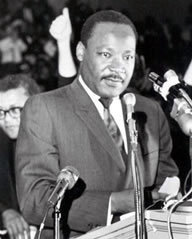 Of the many challenges Dr. King made to the power structure, I believe this is what terrified them the most. It took down apartheid in South Africa twenty years after his death. Non-violence in the face of hate and brutality is probably the bravest thing I can imagine. Would you step in the ring, knowing you can’t hit back? Most won’t fight even when they can hit back. We still have a long way to go toward reaching Dr. King’s dream of being judged by the content of our character. It may be something beyond human ability, to put aside what our eyes tell us. But this man showed us that in the face of immense power eager to crush you down, where raising your fist will only give them reason to destroy you, that we still have the power to make their violent means impotent and redirect it against them like a judo throw.
Of the many challenges Dr. King made to the power structure, I believe this is what terrified them the most. It took down apartheid in South Africa twenty years after his death. Non-violence in the face of hate and brutality is probably the bravest thing I can imagine. Would you step in the ring, knowing you can’t hit back? Most won’t fight even when they can hit back. We still have a long way to go toward reaching Dr. King’s dream of being judged by the content of our character. It may be something beyond human ability, to put aside what our eyes tell us. But this man showed us that in the face of immense power eager to crush you down, where raising your fist will only give them reason to destroy you, that we still have the power to make their violent means impotent and redirect it against them like a judo throw.
Tagged: History, Martin Luther King, Politics



Thomas Pluck's Blog
- Thomas Pluck's profile
- 122 followers



